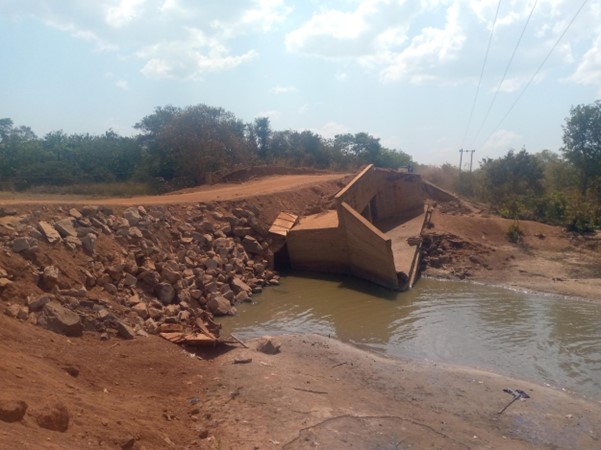The collapse and temporary closure of the Doli Bridge in the Bole District of the Savannah Region have led to a decline in economic activities, particularly affecting truck drivers and impacting trade under the African Continental Free Trade Area (AfCFTA) agreement.
The collapsed bridge, linking the Upper West Region and the southern part of Ghana, succumbed to heavy rain on Sunday, September 17, 2023. The bridge has not been repaired since, with only commuters and some motorists able to use the stretch while heavy trucks resort to alternative routes.
Truck drivers have stated that the bridge’s closure has disrupted road transport, compelling them and businessowners to seek alternative routes through other Economic Community of West African States (ECOWAS) member-countries.
This shift has had a ripple-effect on local businesses, including artisans, vulcanisers, mechanics, food vendors and the hospitality industry within the Bole business districts. Many small businesses have struggled, with some even folding due to the diversion of the road network.
A vulcaniser reported a significant decrease in daily earnings, between GH¢150 and GH¢200, to a fraction of the previous income since the collapse of the bridge. Mechanics, food vendors and hospitality operators in the district echo the sentiment, stating that the bridge’s collapse has brought about economic hardship by disrupting their primary sources of livelihood.
Drivers who used to commute from Techiman via Bole now face a challenging and fuel-consuming diversion through Damongo to Sawla-Fufulso, impacting the timely delivery of perishable goods. Motorists from Wa and its surroundings travelling to the south have also been diverted to use the Sawla-Fufulso road to connect to the Techiman-southern sector route.
Residents expressed concern that the makeshift route created for commuters may not withstand the next rainy season, potentially causing further disruptions. Preliminary investigations suggest that a broken dam alongside the road contributed to the washout, according to the Ghana Highways Authority.
The Ghana Highways Authority’s (GHA) Damongo regional office revealed that the project is in the documentation stage, undergoing procurement processes before approval for the contractor to commence work. Security services note that the road diversion through Bole has necessitated intensive patrols on alternative routes, straining available resources.
A site visit by the B&FT team observed iron rods around the bridge, but contractors and workers were absent. Residents appalled to the government to expedite the repair process and bring about development in the area.
The Bole District Chief Executive (DCE), Veronica Alele, acknowledged the impact on economic activities and assured that efforts are underway to expedite the bridge’s repairs. “It is affecting us economically because small businesses within the district capital do not get much work to do in order to honour their tax obligations to the assembly and also cater for their family upkeep,” she said.
She noted that the assembly remains committed to collaborate with the GHA to fast-track documentation for a timely fix. The assembly is also planning to relocate the dam upstream to prevent future occurrences.
National Vice Chairman of the Ghana Haulage Truck Drivers Association, Braimah Abdul-Rashid, told the B&FT that the development has led to increased costs for truck drivers due to the diversion.
Due to the diversion routes from Damongo to Sawla, the Sawla roundabout has been destroyed by the heavy trucks because most of the heavy vehicles find it difficult to turn and therefore, had to run on the bricks, he said. He also appealed to the government to assist in opening alternative routes while efforts are made to repair the Doli Bridge.










